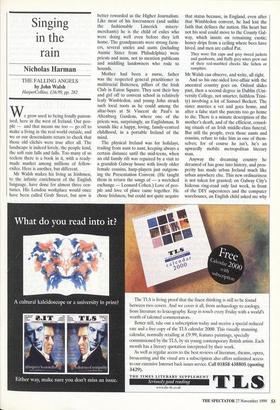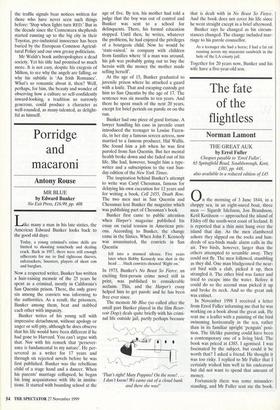Singing in the rain
Nicholas Harman
THE FALLING ANGELS by John Walsh HarperCollins, £16.99, pp. 282
We grow used to being fondly patron- ised, here in the west of Ireland. Our peo- ple — and that means me too — go off to make a living in the real world outside, and we or our descendants return to check that those old clichés were true after all. The landscape is indeed lovely, the people kind, the soft rain falls and falls. Too many of us reckon there is a book in it, with a ready- made market among millions of fellow- exiles. Here is another, but different.
Mr Walsh makes his living as Irishmen, to the infinite enrichment of the English language, have done for almost three cen- turies. His London workplace would once have been called Grub Street, but now is better rewarded as the Higher Journalism. Like most of his forerunners (and unlike the fashionable Limerick misery- merchants) he is the child of exiles who were doing well even before they left home. The grandparents were strong farm- ers, several uncles and aunts (including Auntie Sister from Philadelphia) were priests and nuns, not to mention publicans and middling landowners who rode to hounds.
Mother had been a nurse, father was the respected general practitioner in multiracial Battersea, pillars of the Irish Club in Eaton Square. They sent their boy and girl off to convent school in relatively leafy Wimbledon, and young John struck such local roots as he could among the altar-boys at St Vincent de Paul's in Altenburg Gardens, where one of the priests was, surprisingly, an Englishman. It sounds like a happy, loving, family-centred childhood, in a portable Ireland of the mind.
The physical Ireland was for holidays, trailing from aunt to aunt, keeping always a certain distance until the mid-teens, when an old family rift was repaired by a visit to a grandish Galway house with lovely older female cousins, harp-players just outgrow- ing the Presentation Convent. (He taught them in return the songs of — a wretched exchange — Leonard Cohen.) Love of peo- ple and love of place came together. He chose Irishness, but could not quite acquire that status because, in England, even after that Wimbledon convent, he had lost the faith that defines the nation. His heart but not his soul could move to the County Gal- way, which insists on remaining exotic; honey drips from a ceiling where bees have hived, and men are called Pat.
They wore flat caps and grey tweed jackets and gumboots, and fluffy grey wires grew out of their red-marbled cheeks like lichen or samphire.
Mr Walsh can observe, and write, all right.
And so his one-sided love-affair with the ancestral country goes on. Oxford slides past, then a second degree in Dublin (Uni- versity College, not smarter, faithless Trini- ty) involving a lot of Samuel Beckett. The sister marries a vet and goes home, and after a false start the parents too go home to die. There is a minute description of the mother's death, and of the efficient, consol- ing rituals of an Irish middle-class funeral. But still the people, even those aunts and cousins, refuse to take him as one of them- selves; for of course he isn't, he's an upwardly mobile metropolitan literary man.
Anyway the dreaming country he dreamed of has gone into history, and pros- perity has made urban Ireland much like urban anywhere else. This new ordinariness is not taken for granted; on Galway City's hideous ring-road only last week, in front of the DIY superstores and the computer warehouses, an English child asked me why the traffic signals bear notices written for those who have never seen such things before: 'Stop when lights turn RED.' But in the decade since the Connemara shepherds started running up to the big city in their Toyotas, pre-industrial innocence has been buried by the European Common Agricul- tural Policy and our own greasy politicians.
Mr Walsh's book anthropologises a dead society. Yet his title had promised so much more. It is not easy, despite his exegesis of Milton, to see why the angels are falling, or why his subtitle is `An Irish Romance'. What's so romantic about it, then? Well, perhaps, for him, the beauty and wonder of observing how a culture so self-confidently inward-looking, a tradition so narrowly generous, could produce a character as well-rounded, as many-talented, as delight- ful as himself.



























































































 Previous page
Previous page